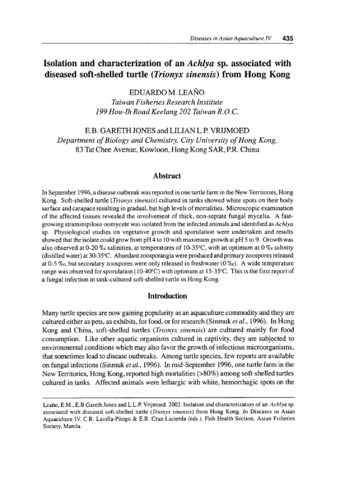Isolation and characterization of an Achlya sp. associated with diseased soft-shelled turtle (Trionyx sinensis) from Hong Kong
- Global styles
- MLA
- Vancouver
- Elsevier - Harvard
- APA
- Help
Share
Abstract
In September 1996, a disease outbreak was reported in one turtle farm in the New Territories, Hong Kong. Soft-shelled turtle (Trionyx sinensis) cultured in tanks showed white spots on their body surface and carapace resulting in gradual, but high levels of mortalities. Microscopic examination of the affected tissues revealed the involvement of thick, non-septate fungal mycelia. A fastgrowing straminipilous oomycete was isolated from the infected animals and identified as Achlya sp. Physiological studies on vegetative growth and sporulation were undertaken and results showed that the isolate could grow from pH 4 to 10 with maximum growth at pH 5 to 9. Growth was also observed at 0-20 salinities, at temperatures of 10-35°C, with an optimum at 0 salinity (distilled water) at 30-35°C. Abundant zoosporangia were produced and primary zoospores released at 0-5 , but secondary zoospores were only released in freshwater (0 ). A wide temperature range was observed for sporulation (10-40°C) with optimum at 15-35°C. This is the first report of a fungal infection in tank-cultured soft-shelled turtle in Hong Kong.
Suggested Citation
Leaño, E. M., Gareth Jones, E. B., & Vrijmoed, L. L. P. (2002). Isolation and characterization of an Achlya sp. Associated with diseased soft-shelled turtle (Trionyx sinensis) from Hong Kong. In C. R. Lavilla-Pitogo & E. R. Cruz-Lacierda (Eds.), Diseases in Asian aquaculture IV: Proceedings of the Fourth Symposium on Diseases in Asian Aquaculture, 22-26 November 1999, Cebu City, Philippines (pp. 435-442). Fish Health Section, Asian Fisheries Society.
Type
Conference paperISBN
9718020160Collections


